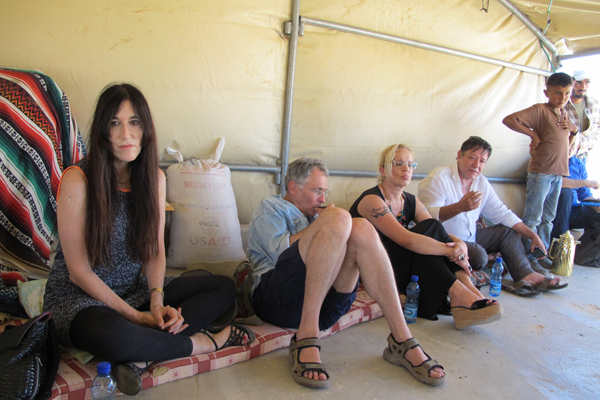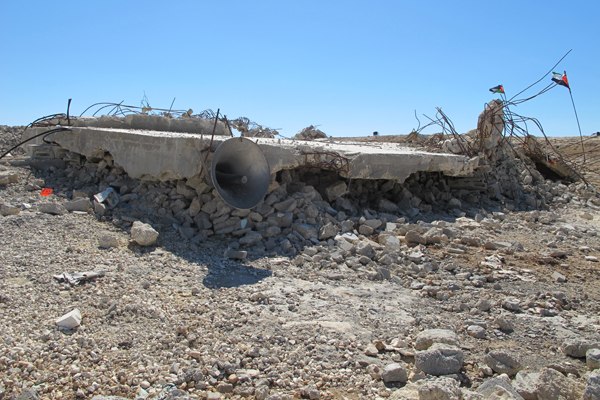Ahead of High Court case, authors sign petition, tour south Hebron Hills villages in support of one thousand residents facing possible eviction.

Twenty-four prominent Israeli writers recently signed a petition in support of Palestinians in danger of eviction from their homes in the South Hebron Hills. Next to Israeli activists, foreign journalists and Palestinian residents, four of the petition signers stood out on Tuesday as they toured three villages in Israel’s line of fire.
“We cannot bring peace today. But the least we can do is to expose and condemn ‘small’ local outrages,” the petition, drafted by David Grossman, reads.
“The only way to push out the Palestinians here was to declare it a military zone,” said attorney Shlomo Lecker, who along with Association for Civil Rights in Israel lawyers, is representing residents from eight villages in a petition to the High Court of Justice that will be heard July 15. “Every structure on the ground has a demolition order,” Lecker said.
Writers Sayed Kashua, Alona Kimhi, Eyal Megged and Zeruya Shalev, along with journalists and a coalition of Israeli activists, met with Palestinian residents in an effort to bring public attention to their ongoing struggle.
More than 1,000 people who live on the land that the IDF declared Firing Zone 918, a military training zone, face possible eviction and forced relocation by the state. Khalid Jabril, a resident of Jinba, the furthest southeast village in the West Bank, said sometimes the army uses people in the village unwillingly in training exercises. Israeli soldiers come to the village at night, wake up families and force the people to go outside, Jabril said. Sometimes there is verbal abuse and arrests are made. He said solders last came to Jinba for training exercises as recently as two days earlier.
The Palestinians, some of whom live in cave dwellings as their families have for generations, are not invaders or enemies of Israel, said Lecker, who first represented inhabitants of villages outside Yatta in 1999, after more than 700 residents were forcibly removed from their homes.
Well-known writers showed up and sat in the front row of the courtroom then to show support for the Palestinians in that case.
“I believe it made some difference,” Lecker reflected.
A village leader in Jinba Othman Jibril said he hoped the courtroom presence of Israeli writers would be even larger next month.
“The residents here are not doctors or lawyers. They’re farmers [and herders],” Jibril said. “They rely on their land for their livelihood.”
Twenty people live together in one cave dwelling in Jinba. Their toilet is inside the cave, despite health and sanitation concerns, because they fear the IDF will demolish any outhouse structure built outside the cave.
“If someone tells you to leave your home how would you feel?” said Said Mohammad Ibrahim Rabaa, a resident of Ar Rakeez, a nearby village in the South Hebron Hills. He said some of the cave dwellings were built three generations ago. His great-grandfather built his home, he added.

Israel claims the Palestinians living on the 30 square kilometers (or 7,400 acres) of land designated Firing Zone 918 are not permanent residents. However, lawyers and activists said they have been living there for 200 years, as evidenced by Defense Ministry documents and historical accounts.
But Lecker rejected the question of permanent residence, noting that the Palestinians own the land. The military, in this case, does not have the right to push people off privately owned land, he asserted.
In addition, international law says occupied land cannot be confiscated for the purpose of military training unless it is being used to prepare for current military action or immediate security needs.
Under a large tent in Mufaqara, where concrete remnants of a mosque demolished in 2011 still surround the cracked foundation, the three writers who stayed for the final leg of the tour spoke about their hope to raise public awareness with the petition.
“I think Israeli society is tired,” said novelist Zeruya Shalev. But, “you can wake her up from time to time.” Shalev said she plans to attend the hearing in July.
“Our whole image of the occupation has become very virtual, very abstract,” said Alona Kimhi, another novelist.
The Palestinian residents of Jibna and Mufaqara said they are resolved to remain on their land.
“We tell the Israeli state, you may destroy the cement, but you will not destroy our steadfastness,” a Mufaqara village leader said.
Lecker said he doubts the courts would offer any final decision on possible evictions at the July 15 hearing. But the military, he added, will likely continue to harass villagers living within Firing Zone 918 and demolish structures in the interim.
“[An] eviction of 1,000 people is much harder than demolition,” Lecker said.
Related:
Hundreds protest plan to demolish entire Palestinian village
Call to action: Protest the demolition of entire Palestinian village
Palestinian from Area C describes a life in constant need of rebuilding
South Hebron Hills: A military regime for none or for all
